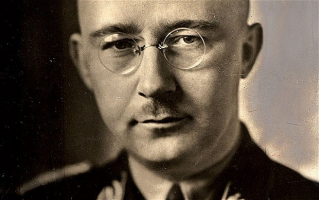Top 11 Interesting Facts about Bill Clinton
William Jefferson Blythe III, better known by his given name Bill Clinton, was the 42nd president of the United States (1993–2001). He presided over the ... read more...nation's longest economic expansion during a time of peace. He was impeached in 1998, becoming the second president of the United States to do so; the Senate cleared him in 1999. Clinton is regarded as a member of the Democratic Party's New Democratic, or centrist, faction. Although he is frequently described as "moderate" or "moderate," he is likely best understood as a populist. So, to get more fascinating information, let’s check these most interesting facts about Bill Clinton below!
-
At the Julia Chester Hospital in Hope, Arkansas, Clinton was born. He was born to Virginia Dell Cassidy and William Jefferson Blythe Jr., a traveling salesman who had perished in an auto accident three months earlier (later Virginia Kelley). Soon after Bill was born, Virginia left him in Hope with her parents, who had a small grocery shop, and went to New Orleans to study nursing. Clinton's grandparents sold items on credit to customers of all races under the racial segregation that prevailed in the southern United States at the time.
Although Virginia Dell Blythe and Roger Clinton's marriage was rocky (they split and then remarried) and her husband was an alcoholic, their kid eventually adopted his stepfather's name. Although he immediately began using his stepfather's last name, Clinton did not formally take his stepfather's last name as his own until he was 15 years old. According to Clinton, his stepfather was an alcoholic and a gambler who frequently mistreated his mother and half-brother, Roger Clinton Jr. He repeatedly threatened to use violence against his stepfather to keep them safe.
Bill Clinton, who was raised in part by his maternal grandmother, had political aspirations from an early age. According to him, these dreams were cemented in July 1963 when he met and shook hands with President John F. Kennedy.
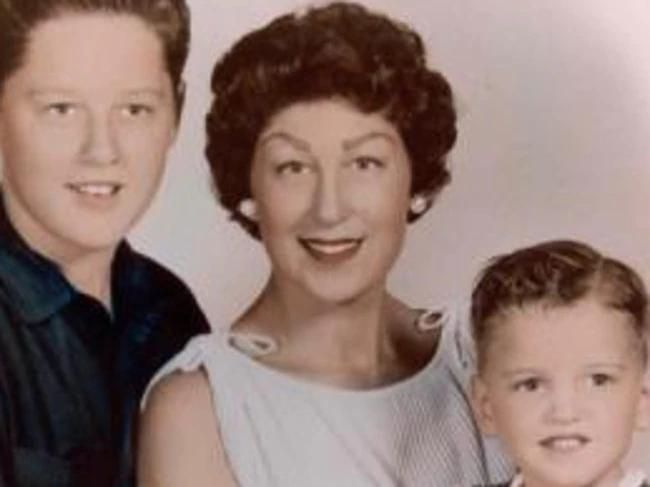
Photo: https://www.news.com.au/ 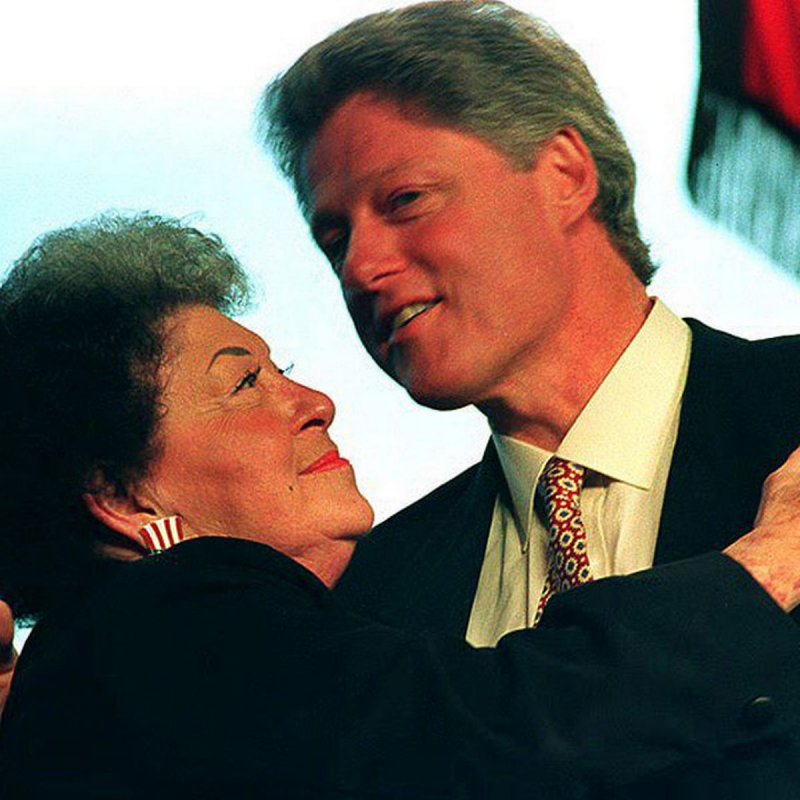
Photo: https://www.mirror.co.uk/ -
In 1964, Clinton attended Georgetown University in Washington, D.C. He earned a degree in international affairs there in 1968. His junior and senior years were spent working as an intern for Sen. J. William Fulbright, the Arkansas Democrat who served as the chairman of the U.S. Senate Committee on Foreign Relations. During his freshman and sophomore years, he was voted student body president. Clinton, like many other young men of his time, opposed the war, and Fulbright was a vociferous opponent.
As a Rhodes Scholar at Oxford University in 1968, he was granted a draft deferment for the first year of his studies. Later, he attempted to extend the deferment by applying to the Reserve Officers' Training Corps (ROTC) program at the University of Arkansas School of Law. He quickly changed his mind and went back to Oxford, making him eligible for the draft, but he was not picked. While studying at Oxford, Clinton sent a letter to the head of the Arkansas ROTC program in which he expressed gratitude for "saving" him from the draft and expressed concern that his opposition to the war might harm his future "political viability." Clinton dabbled with marijuana during this time, and his assertion that he "didn't inhale" would later be widely mocked.
After earning his law degree from Yale University in 1973, Clinton joined the University of Arkansas School of Law's faculty and remained there until 1976. He unsuccessfully sought election to the U.S. House of Representatives in 1974. He married Hillary Rodham (Hillary Clinton), an attorney and fellow Yale Law graduate, in 1975. She went on to actively participate in his political career.
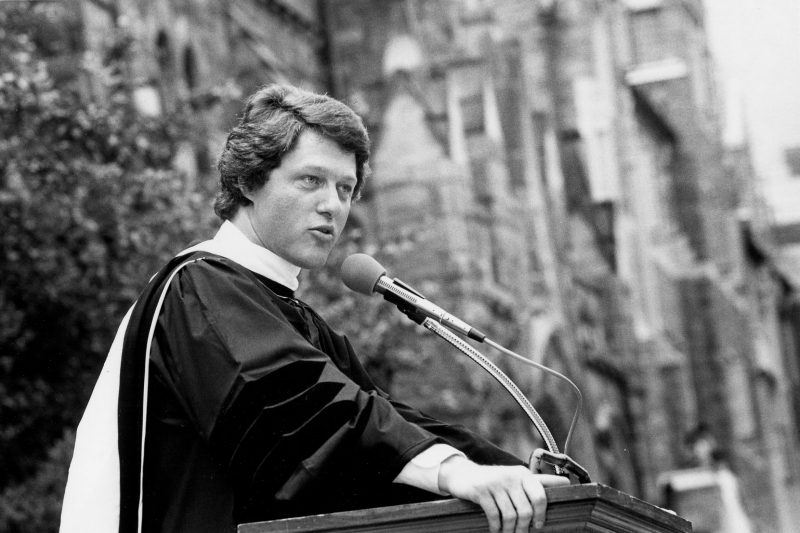
Photo: https://repository.library.georgetown.edu/ 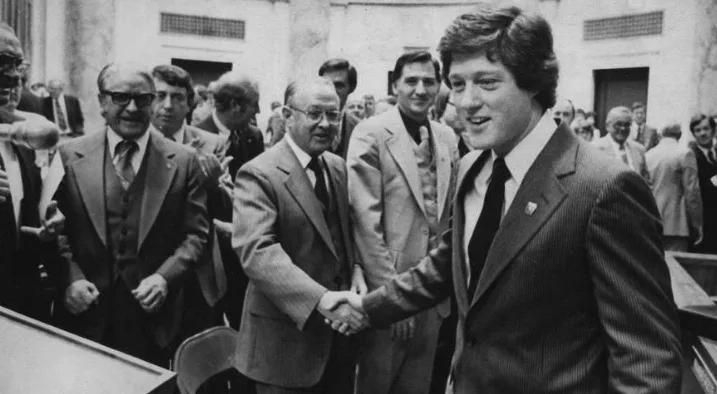
Photo: https://www.snopes.com/ -
He was chosen as Arkansas Governor general in 1976, and when he was elected governor in 1978, he was the youngest leader of the nation in forty years, which is one of the most interesting facts about Bill Clinton.
After serving as governor for two exciting years, Clinton lost his quest for reelection in 1980, the year Chelsea, his daughter, an only child, was born. He regained the governor's office in 1982 and was successively re-elected three more times by significant margins after making amends to voters for unpopular decisions he had made as governor (such as funding highway improvement projects with increases in the state gasoline tax and automobile licensing fees).
He required teachers and students to take competency tests, and as a pragmatic, moderate Democrat, he encouraged investment in the state by giving tax advantages to businesses. He rose to prominence within the Democratic Leadership Council, a group that aimed to realign the party's goals away from their traditional liberalism and toward what they saw as the heart of American politics.
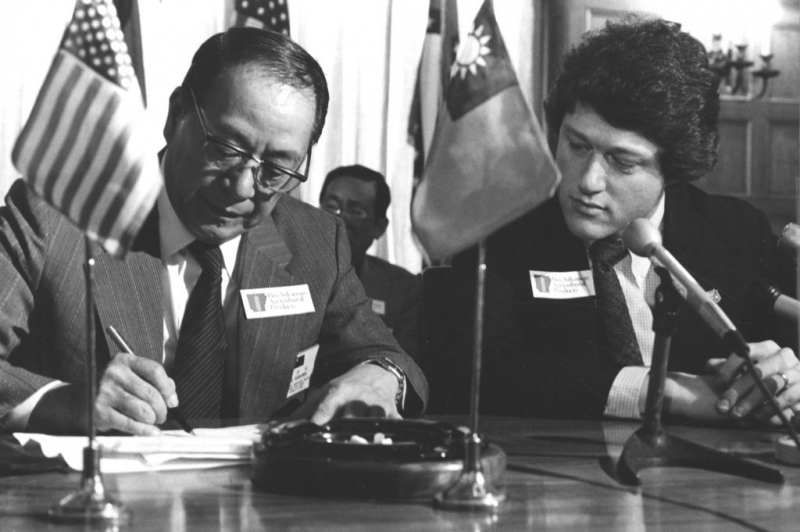
Photo: https://robertslibrary.org/ 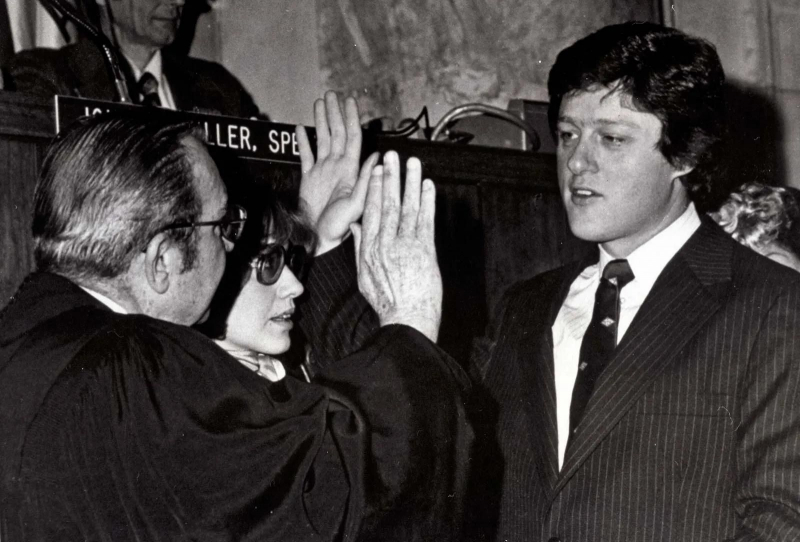
Photo: https://www.britannica.com/ -
Clinton announced his presidential run while he was still the governor of Arkansas, which is one of the most interesting facts about Bill Clinton. His candidacy almost failed because of extensive public coverage of his claimed 12-year liaison with Gennifer Flowers, an Arkansas lady, just before the New Hampshire primary. Clinton and his wife acknowledged experiencing marital issues in a subsequent appearance on the television news show 60 Minutes, which was seen by millions of viewers.
Soon after, Clinton's popularity increased once more, and he finished a strong second in New Hampshire, where he declared himself the "Comeback Kid." He eventually secured the Democratic presidential nomination in 1992 based on his pragmatic approach, his apparent empathy for the issues of everyday Americans (his remark "I feel your pain" became a well-known phrase), and his personable friendliness. Clinton and his running mate, Tennessee Sen. Al Gore, argued that 12 years of Republican rule had resulted in political and economic stagnation as they took on incumbent President George W. Bush. With 43 percent of the popular vote to Bush's 37 percent and Ross Perot's 19 percent in November, the Clinton-Gore ticket defeated both Bush and the independent candidate. Clinton also defeated Bush by a vote of 370 to 168 in the electoral college.
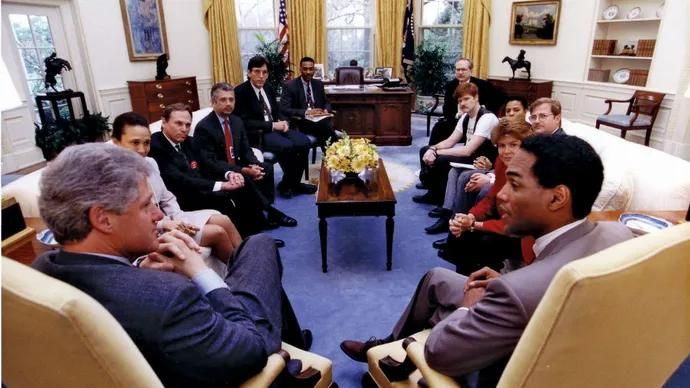
Photo: https://www.britannica.com/ 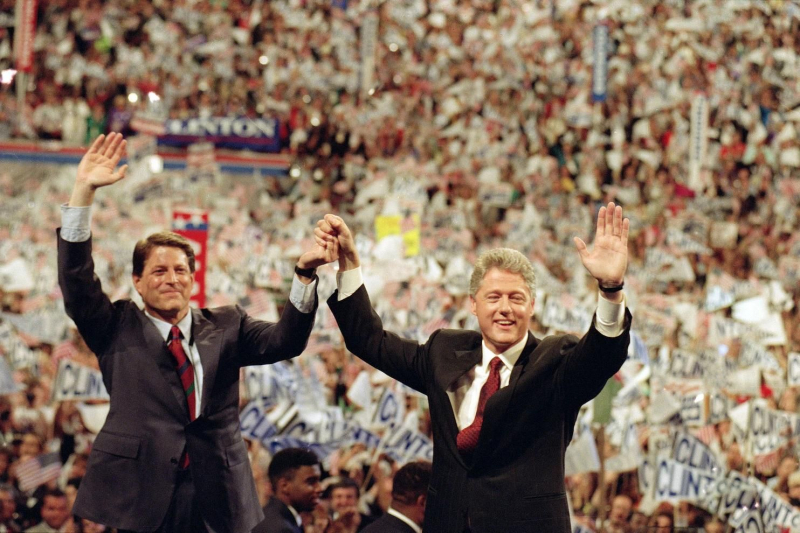
Photo: https://www.britannica.com/ -
On January 20, 1993, Clinton took office as the 42nd president of the United States. At the time, Clinton had a staff that lacked experience and was physically fatigued. The Clinton administration had a rocky beginning, as a result of what some detractors referred to be incompetence and poor judgment. Conservatives and other military commanders, notably Gen. Colin Powell, chairman of the Joint Chiefs of Staff, criticized his attempt to carry out a campaign promise to abolish discrimination against homosexual men and lesbians in the armed forces. Clinton's reaction was a compromise policy that didn't appease either side of the argument and was encapsulated by the phrase "Don't ask, don't tell." After concerns about the domestic servants they had employed were aroused, Clinton's initial two selections for attorney general withdrew.
His $16 billion stimulus plan, which was mostly intended to support liberally favored inner-city initiatives, was thwarted in the Senate by a Republican filibuster. His popularity was at an all-time low at the 100-day milestone of his administration.
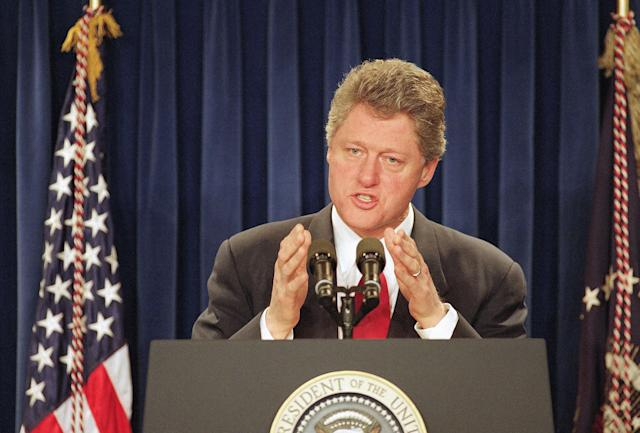
Photo: https://finance.yahoo.com/ 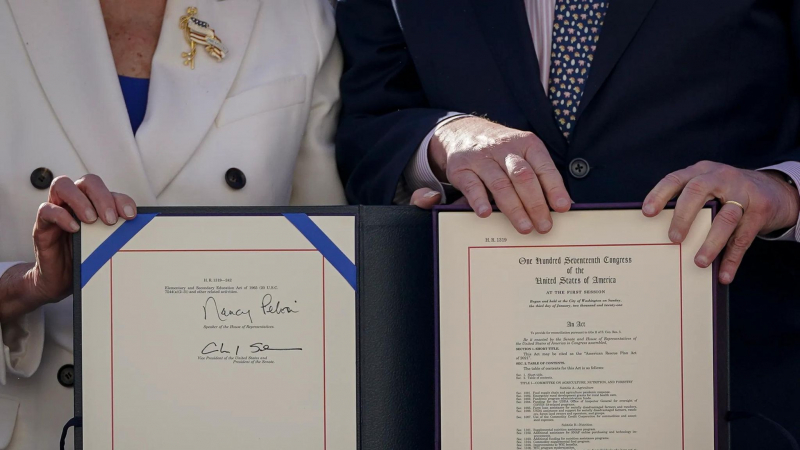
Photo: https://www.newyorker.com/ -
Clinton gave a significant speech to Congress on September 22, 1993, outlining a plan for health care reform that aimed to achieve universal coverage through a federal health care program. Conservatives objected to both the propriety of the arrangement and Hillary Rodham Clinton's feminism when he named his wife to chair the Task Force on National Health Care Reform, a new position for the nation's first lady. They collaborated with lobbyists for the American Medical Association, small business associations, and the insurance sector to vehemently oppose the task force's final recommendation, the Health Security Act. Despite extensive discussions with Congress, all attempts to pass compromise legislation were unsuccessful.
The program, according to Clinton biographer John F. Harris, failed due to a lack of cooperation within the White House. Despite the Democratic majority in Congress, the initiative to establish a universal healthcare system finally failed in August 1994 when George J. Mitchell's compromise proposal was unable to secure a majority of votes. The bill's rejection represented the Clinton administration's first significant legislative setback.
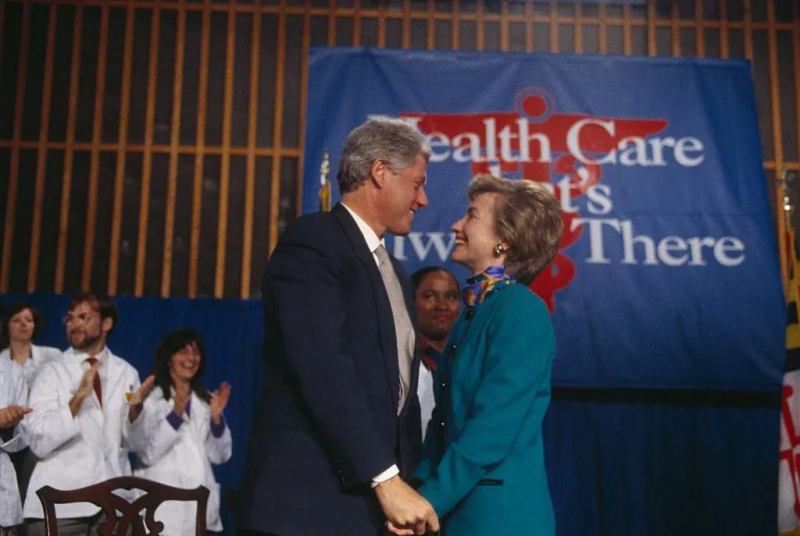
Photo: https://time.com/ 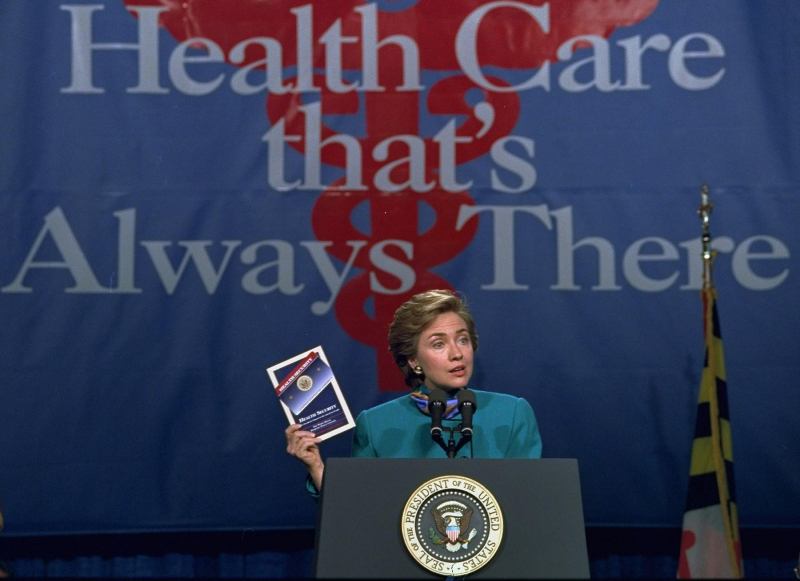
Photo: https://prospect.org/ -
Despite these early slip-ups, Clinton's first term was marked by many achievements, such as the North American Free Trade Agreement's approval by Congress, which established a free-trade zone for the United States, Canada, and Mexico. Throughout his presidency, Clinton also appointed several women and minorities to important government positions. These included Madeleine Albright, the first female secretary of state, Janet Reno, the attorney general, Donna Shalala, the secretary of health and human services, Joycelyn Elders, the surgeon general, and Ruth Bader Ginsburg, the second female justice in the US Supreme Court.
During Clinton's first term, Congress passed the Violence Against Women Act and the Family and Medical Leave Act, as well as about 30 other significant bills dealing with education, crime prevention, the environment, and women's and family issues. The deficit-reduction package passed the Senate with Gore's tie-breaking vote.
An inquiry of Clinton and his wife's business dealings with Whitewater, an Arkansas house construction enterprise, was given the go-ahead by Attorney General Reno in January 1994. The Whitewater investigation, which was overseen by independent counsel Kenneth Starr starting in August and costing more than $50 million, lasted several years and produced no indisputable proof of Clinton's misconduct.
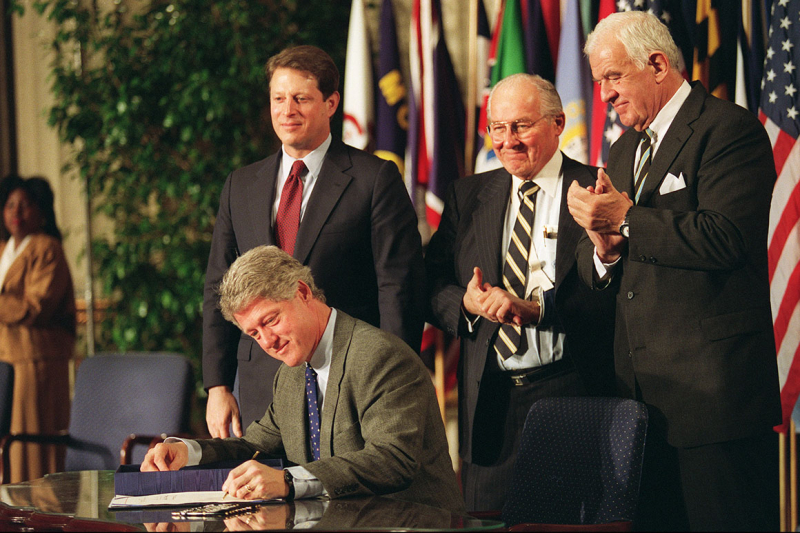
Photo: https://www.politico.com/ 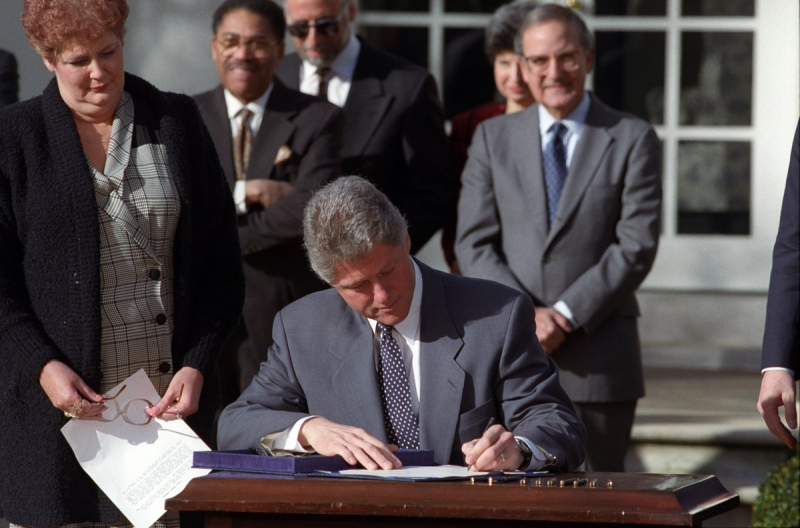
Photo: https://twitter.com/ -
Clinton was reelected with ease in 1996, helped along by a recovering and strengthening economy. Despite scandal being a constant presence in the White House—a fellow Arkansan who had served in the administration committed suicide; there were rumors of financial irregularities that had occurred in Little Rock; former associates were indicted and found guilty of crimes, and rumors of sexual impropriety involving the president persisted. The electoral vote was 379 to 159, and he won 49 percent of the popular vote to Republican Bob Dole's 41 percent and Ross Perot's 8 percent. Clinton's second term saw a continuation of the economy's robust growth, which finally set a record for the nation's longest peacetime boom. The first balanced budget since 1969 and the highest budget surpluses in the nation's history were being managed by the Clinton administration by 1998. In addition to record high house ownership rates, the thriving economy also resulted in the lowest jobless rate in over 30 years.
Hillary Clinton successfully steered the Foster Care Independence Act through Congress two years after helping to pass the Adoption and Safe Families Act a year later. The Republican Congress was persuaded to support the Balanced Budget Act of 1997 by Bill Clinton. He declared in October 1997 that he was acquiring hearing aids because of age-related hearing loss and prior musical training.
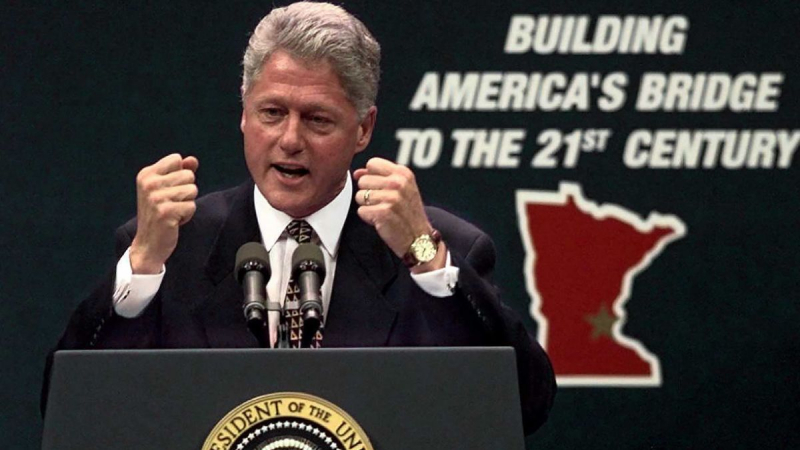
Photo: https://edition.cnn.com/ 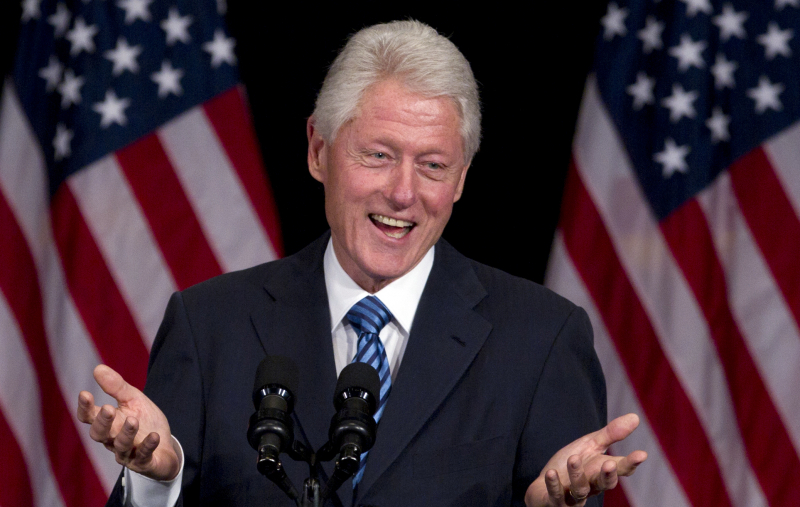
Photo: https://www.npr.org/ -
Starr was given the authorization to broaden the scope of his ongoing inquiry in 1998 to establish whether Clinton had urged Monica Lewinsky, a 24-year-old intern at the White House, to falsely claim under oath that she and Clinton had not had an affair. This is also one of the most interesting facts about Bill Clinton. Clinton vehemently denied having an affair in front of the public on numerous occasions. Conservatives and liberals alike revived their criticism of Clinton's character in response to his compelled testimony, which even to Clinton's allies seemed evasive and dishonest (he answered one question by saying, "It depends on what the definition of the word is").
However, during questioning by special counsel Kenneth Starr before a federal grand jury in August of that same year, Mr. Clinton acknowledged having an "improper" connection with Ms. Lewinsky. Clinton apologized to his family and the American public after concrete proof of the affair surfaced. The House of Representatives passed two articles of impeachment for perjury and obstruction of justice in 1998 based on Starr's 445-page report and supporting documentation. In 1999, the Senate cleared Clinton of the allegations. Clinton's job approval rating remained strong despite his impeachment.
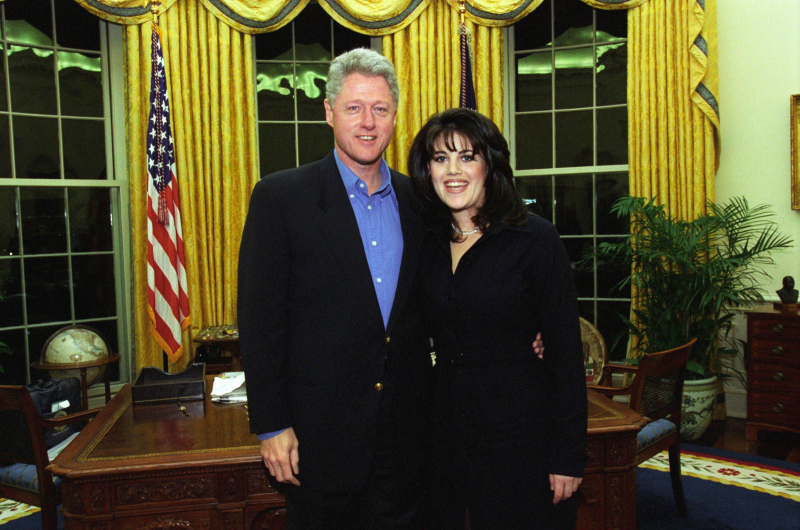
Photo: https://en.wikipedia.org/ 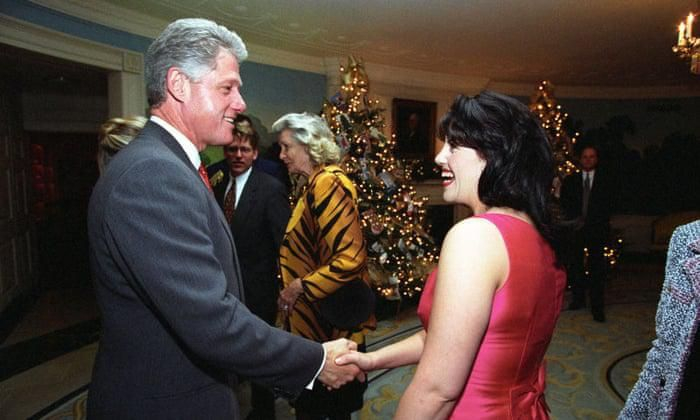
Photo: https://afamily.vn/ -
In December 1998, Clinton issued an executive order for a four-day bombing campaign against Iraq in response to that country's refusal to fully comply with United Nations weapons inspectors (the bombing also happened to launch the formal congressional impeachment hearings). NATO forces under American command successfully waged a three-month bombing campaign against Yugoslavia in 1999 to put an end to Serbian atrocities on ethnic Albanians in the Kosovo area.
Clinton was regarded as a mediator on his journeys to Ireland and Northern Ireland in 1998 and 2000. In 2000, he made history by being the first American president to visit Vietnam since the conclusion of the Vietnam War. He spent the last few weeks of his administration trying in vain to mediate a comprehensive peace deal between Israel and the Palestinians. Clinton received harsh criticism from both Democrats and Republicans shortly before he left the office for having granted several dubious pardons, including one to the ex-spouse of a significant Democratic Party donor.
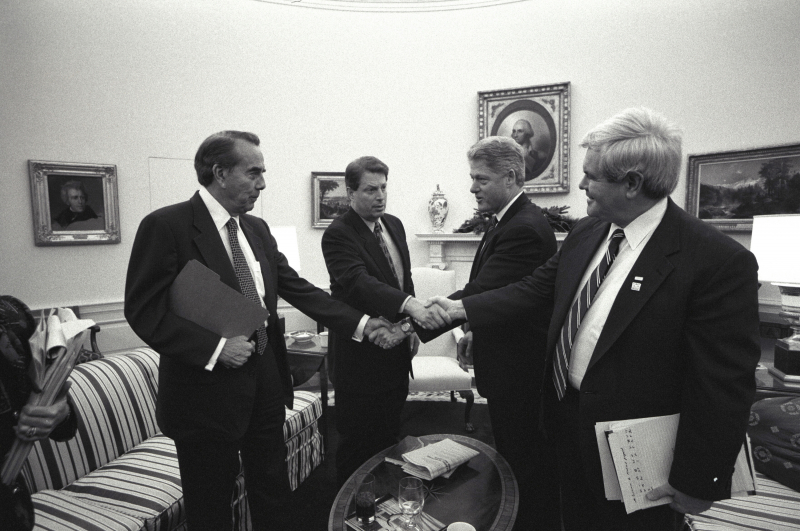
Photo: https://www.clintonlibrary.gov/ 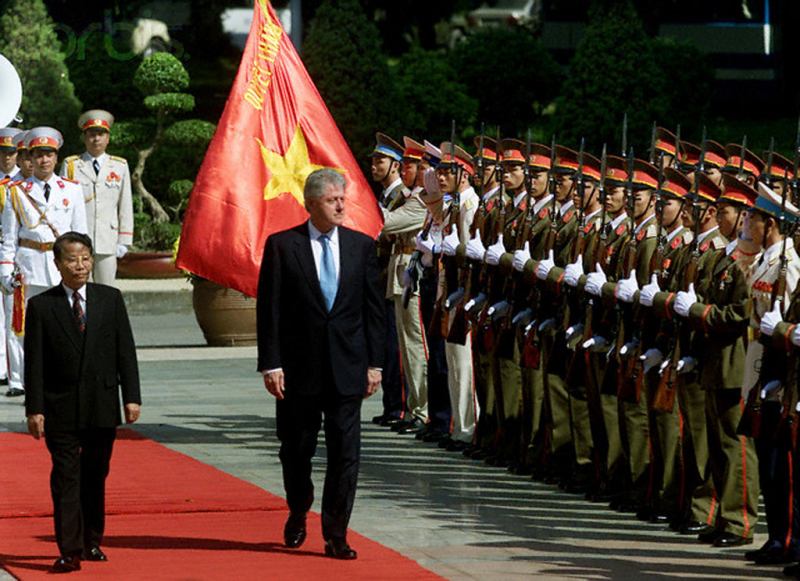
Photo: https://www.flickr.com/ -
Clinton's wife started her political career as his administration came to a close. The first spouse of a U.S. president to be elected to Congress, Hillary Rodham Clinton represented New York in the U.S. Senate in 2000. She later nearly missed out on the Democratic Party's presidential candidacy in 2008 to Barack Obama, but Obama nonetheless selected her secretary of state during his government. Bill Clinton continued to be involved in politics and was a well-liked lecturer. He launched the William J. Clinton Foundation in 2001, a charitable organization that tackled numerous worldwide concerns through initiatives like the Clinton Global Initiative (2005), the Clinton Economic Opportunity Initiative (2002), and the Clinton Climate Initiative (2006). In Little Rock, Arkansas, the William J. Clinton Presidential Library and Museum debuted in 2004.
Bill Clinton was selected by United Nations Secretary-General Kofi Annan to serve as a special envoy for recovery operations the following year after a tsunami in the Indian Ocean had caused massive death and destruction, a role he retained until 2007. As chairman of the National Constitution Center, a history museum in Philadelphia, Clinton succeeded George H.W. Bush in 2009. He was appointed a UN special envoy to Haiti later that year. Following the catastrophic earthquake that hit that nation in January 2010, Clinton's UN responsibilities were expanded to include managing relief efforts and reconstruction. Obama received support from Clinton during the 2012 US general election, which helped him secure a second term in office. Clinton received the Presidential Medal of Freedom in 2013.
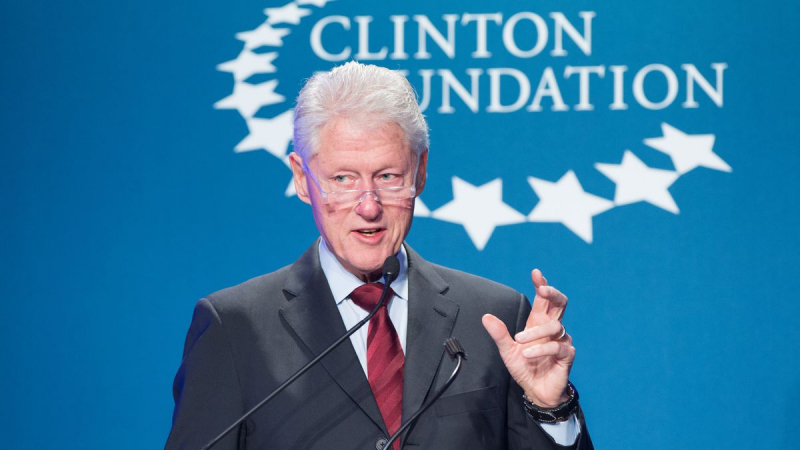
Photo: https://www.vox.com/ 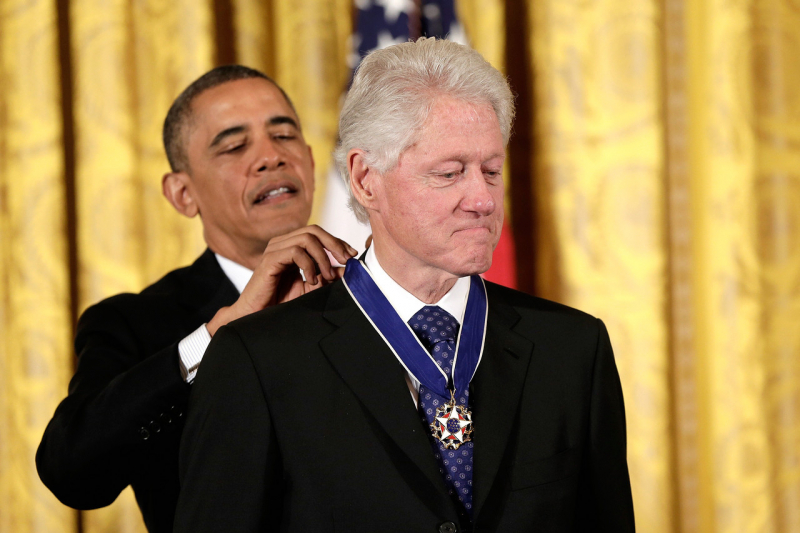
Photo: https://www.wsj.com/






























